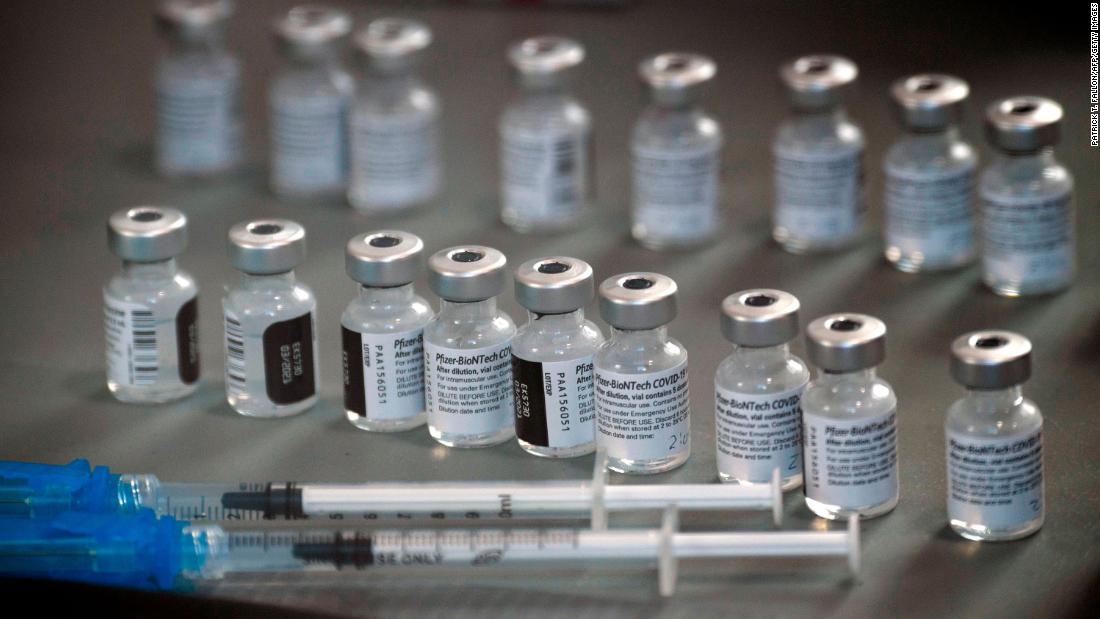PHE’s Siren study, conducted on health workers under the age of 65, found that one dose of the vaccine reduced the risk of infection by 72% after three weeks, while two doses of the vaccine reduced the risk of infection by 85%. . This high level of protection has extended to the B.1.1.7 coronavirus variant first identified in the UK in December.
Health workers were tested for Covid-19 infection every two weeks using PCR tests and twice a week with lateral flow tests, said Dr. Susan Hopkins, director of strategic response at PHE, explained and said, “there were a lot of asymptomatic tests,” she said. .
“Overall, we are seeing a very strong effect on reducing any infection: asymptomatic and symptomatic,” Hopkins told a news conference held by the UK’s Science Media Center on Monday.
PHE also analyzed routine test data based on symptomatic diseases in more than 12,000 people, showing that one dose of the Pfizer / BioNTech vaccine was 57% effective against symptomatic COVID-19 disease in those older than 80 years four weeks after the first dose. It increased to 88% one week after the second dose.
Early data also showed that people who were vaccinated who were later infected were much less likely to die from the virus or be hospitalized. People older than 80 who became infected after vaccination were 41% less likely to be hospitalized with the virus and 57% less likely to die from it.
PHE predicted that the protection against serious diseases would probably be more than 75% in those who received one dose of Pfizer-BioNTech vaccine.
‘The good sign is generally that we are starting to see a decline in hospitalizations and deaths in those vaccinated age groups [and] at least some can be attributed to the vaccination program, “said Dr. Mary Ramsay, head of vaccination at PHE, during the press conference.
She said that although the UK’s current exclusion has played a role in the decline in hospitalizations, the faster decline can be attributed in some respects to the vaccination program.
In the PHE release, Ramsay warned that, despite the encouraging signs, “we do not yet know how much these vaccines will reduce the risk of passing Covid-19 to others,” adding that vaccines should remain around the stay. to follow. home orders.
The UK has focused on vaccinating as many high-risk people as possible with the first dose.
Ramsay said the findings “strengthen the policy of giving that single dose to more people to prevent more deaths and more admissions now, and then go back later and get the second dose that will provide longer protection.”
British Health Secretary Matt Hancock said it was “extremely encouraging” that data supported the UK government’s “decision to maximize the number of people vaccinated with a single dose”.
“The protection against serious diseases is at least 75% or higher, and that is in line with what you see in Scotland,” Ramsay told a news conference, citing early data from a Scottish study on the effects of the Pfizer and Oxfords. -AstraZeneca community surveys.
Significant drop in hospital admissions
In the study, which was also released on Monday, the introduction of the Covid-19 vaccine was linked to a significant reduction in the risk of hospitalization because the disease occurs in Scotland.
Researchers compared hospital admissions among those who had their first dose, and those who did not.
By the fourth week after receiving the initial dose, the Pfizer vaccine reduced the risk of hospitalization from Covid-19 by up to 85%.
The Oxford-AstraZeneca vaccine reduced the risk of hospitalization by up to 94%.
The preliminary study, which has not yet been peer-reviewed, is the first to look at the effect of the two vaccines on the prevention of serious diseases, leading to hospitalization across the country, with previous efficacy results due to clinical trials. .
The EAVE II project, carried out by researchers from the universities of Edinburgh, Strathclyde, Aberdeen, Glasgow and St Andrews and Public Health Scotland (PHS), analyzed a data set covering almost the entire Scottish population of 5.4 million people.
Researchers analyzed the data for each week between December 8 and February 15. During this period, 1.14 million vaccines were administered (about 650,000 people received the Pfizer shot and about 490,000 had the Oxford-AstraZeneca one), with 21 per cent of the Scottish population receiving it for the first time. according to a press release from the University of Edinburgh.
Under the age of 80 and older – one of the biggest risk groups – vaccination was associated with an 81 percent reduction in Covid-19’s hospitalization risk in the fourth week, when the results for both vaccinations were combined, according to the press release.
“These results are very encouraging and have given us good reasons to be optimistic about the future. We now have national evidence – across the country – that vaccination provides protection against Covid-19 hospitalizations,” said Aziz Sheikh, lead researcher. director of the Usher Institute of the University of Edinburgh, said in the release.
“The implementation of the first vaccine dose must now be accelerated worldwide to overcome this terrible disease.”
Arne Akbar, president of the British Society for Immunology, added: “We must now understand how long this protection lasts for one dose of the vaccine.”
“Although further research is needed, these new findings should generally provide reassurance around the UK’s decision to offer the two doses of the vaccine 12 weeks apart.”
